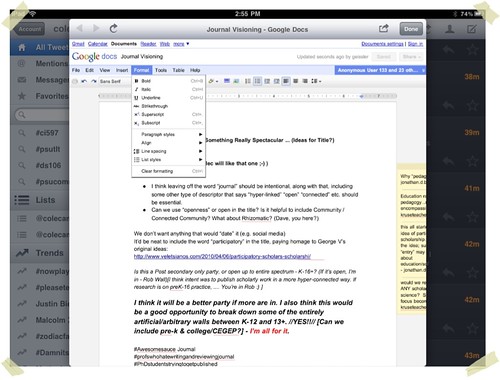Twitter was abuzz with the news that Yahoo! will be shutting down Delicious, the popular social bookmarking site. Delicious has been a very valuable tool to me for several years now, and I, like others, will be sad to see it go.
However, rather than dwell on the news, it’s better to move on, and find a viable alternative, especially one that will allow the migration of data from a Delicious account to a new host. Rather than trying to find a solution on my own, I thought I would crowdsource an alternative through the sharing of a collaborative Google Document. This crowdsourced approach was very successful back in April when Ning announced their service would no longer be free, so I thought it would be worthwhile to try it again.
I set up the shared Google Doc, shared it, sent out a tweet, and the magic began!

In literally seconds, the document began to fill out as people arrived to collaborate or observe. On many occasions, people were booted out as the maximum number of editors had been reached (a number that seems to be around 50 simultaneous users). It was interesting to watch the information emerge. As well, I was fascinated to see others who focused on the formatting and readability of the document. Individuals decided what they could contribute, and worked together for a common goal.
Below is a screencast recorded by Sean Nash of the document as it was being edited minutes after it was tweeted out.
Six hours later, we have hundreds of edits, at least 40 authors (evidenced by the authors that wrote their names on the bottom of the document), and at least sixteen viable alternatives to Delicious with pros/cons listed.
This is a wonderful way to get things done. To me, it’s truly breathtaking to watch and think about what is going on here, and really to consider the geographic distribution of this effort.
However, amazed as I am by what I saw here, this and the Ning example are relatively easy-to-solve problems. I wonder – how well does this kind of crowdsourcing work with deeper, more difficult, or perhaps, more meaningful questions? Thoughts?
You can find the Delicious Alternatives document here.


